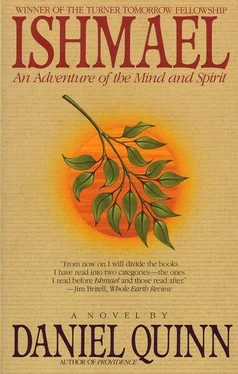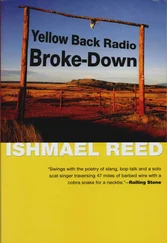Because it was backed by darkness, the glass in this window was black—opaque, reflective. I made no attempt to see beyond it as I approached; I was the spectacle under observation. On arrival, I continued to gaze into my own eyes for a moment, then rolled the focus forward beyond the glass—and found myself looking into another pair of eyes.
I fell back, startled. Then, recognizing what I’d seen, I fell back again, now a little frightened.
The creature on the other side of the glass was a full–grown gorilla.
Full–grown says nothing, of course. He was terrifyingly enormous, a boulder, a sarsen of Stonehenge. His sheer mass was alarming in itself, even though he wasn’t using it in any menacing way. On the contrary, he was half–sitting, half–reclining most placidly, nibbling delicately on a slender branch he carried in his left hand like a wand.
I did not know what to say. You will be able to judge how unnerved I was by this fact: that it seemed to me I should speak—excuse myself, explain my presence, justify my intrusion, beg the creature’s pardon. I felt it was an affront to gaze into his eyes, but I was paralyzed, helpless. I could look at nothing else in the world but his face, more hideous than any other in the animal kingdom because of its similarity to our own, yet in its way more noble than any Greek ideal of perfection.
There was in fact no obstacle between us. The pane of glass would have parted like a tissue had he touched it. But he seemed to have no idea of touching it. He sat and gazed into my eyes and nibbled the end of his branch and waited. No, he wasn’t waiting; he was merely there , had been there before I arrived and would be there when I’d left. I had the feeling I was of no more significance to him than a passing cloud is to a shepherd resting on a hillside.
As my fear began to ebb, consciousness of my situation returned. I said to myself that the teacher was plainly not on hand, that there was nothing to keep me there, that I should go home. But I didn’t like to leave with the feeling that I’d accomplished nothing at all. I looked around, thinking I’d leave a note, if I could find something to write on (and with), but there was nothing. Nevertheless, this search, with the thought of written communication in mind, brought to my attention something I’d overlooked in the room that lay beyond the glass; it was a sign or poster hanging on the wall behind the gorilla. It read:
WITH MAN GONE,
WILL THERE
BE HOPE
FOR GORILLA?
This sign stopped me—or rather, this text stopped me. Words are my profession; I seized these and demanded that they explain themselves, that they cease to be ambiguous. Did they imply that hope for gorillas lay in the extinction of the human race or in its survival? It could be read either way.
It was, of course, a koan—meant to be inexplicable. It disgusted me for that reason, and for another reason: because it appeared that this magnificent creature beyond the glass was being held in captivity for no other reason than to serve as a sort of animate illustration for this koan.
You really ought to do something about this, I told myself angrily. Then I added: It would be best if you sat down and were still.
I listened to the echo of this strange admonishment as if it were a fragment of music I couldn’t quite identify. I looked at the chair and wondered: Would it be best to sit down and be still? And if so, why? The answer came readily enough: Because, if you are still, then you will be better able to hear. Yes, I thought, that is undeniably so.
For no conscious reason, I lifted my eyes to those of my beastly companion in the next room. As everyone knows, eyes speak. A pair of strangers can effortlessly reveal their mutual interest and attraction in a single glance. His eyes spoke, and I understood. My legs turned to jelly, and I barely managed to reach the chair without collapsing.
“But how?” I said, not daring to speak the words aloud.
“What does it matter?” he replied as silently. “It’s so, and nothing more needs to be said.”
“But you—” I sputtered. “You are…”
I found that, having come to the word, and with no other word to put in its place, I could not speak it.
After a moment he nodded, as if in acknowledgment of my difficulty. “I am the teacher.”
For a time, we gazed into each other’s eyes, and my head felt as empty as a derelict barn.
Then he said: “Do you need time to collect yourself?”
“Yes!” I cried, speaking aloud for the first time.
He turned his massive head to one side to peer at me curiously. “Will it help you to listen to my story?”
“Indeed it will,” I said. “But first—if you will—please tell me your name.”
He stared at me for a while without replying and (as far as I could tell at that time) without expression. Then he proceeded as if I hadn’t spoken at all.
“I was born somewhere in the forests of equatorial West Africa,” he said. “I’ve never made any effort to find out exactly where, and see no reason to do so now. Do you happen to know anything about animal collecting for zoos and circuses?”
I looked up, startled. “I know nothing at all about animal collecting.”
“At one time, or at least during the thirties, the method commonly used with gorillas was this: On finding a band, collectors would shoot the females and pick up all the infants in sight.”
“How terrible,” I said, without thinking.
The creature replied with a shrug. “I have no actual memory of the event—though I have memories of still earlier times. In any case, the Johnsons sold me to a zoo in some small northeastern city—I can’t say which, for I had no awareness of such things as yet. There I lived and grew for several years.”
He paused and nibbled absentmindedly on his branch for a while, as if gathering his thoughts.
In such places (he went on at last), where animals are simply penned up, they are almost always more thoughtful than their cousins in the wild. This is because even the dimmest of them cannot help but sense that something is very wrong with this style of living. When I say that they are more thoughtful, I don’t mean to imply that they acquire powers of ratiocination. But the tiger you see madly pacing its cage is nevertheless preoccupied with something that a human would certainly recognize as a thought. And this thought is a question: Why? “Why, why, why, why, why, why?” the tiger asks itself hour after hour, day after day, year after year, as it treads its endless path behind the bars of its cage. It cannot analyze the question or elaborate on it. If you were somehow able to ask the creature, “Why what? ” it would be unable to answer you. Nevertheless this question burns like an unquenchable flame in its mind, inflicting a searing pain that does not diminish until the creature lapses into a final lethargy that zookeepers recognize as an irreversible rejection of life. And of course this questioning is something that no tiger does in its normal habitat.
Before long I too began to ask myself why . Being neurologically far in advance of the tiger, I was able to examine what I meant by the question, at least in a rudimentary way. I remembered a different sort of life, which was, for those who lived it, interesting and pleasant. By contrast, this life was agonizingly boring and never pleasant. Thus, in asking why , I was trying to puzzle out why life should be divided in this way, half of it interesting and pleasant and half of it boring and unpleasant. I had no concept of myself as a captive; it didn’t occur to me that anyone was preventing me from having an interesting and pleasant life. When no answer to my question was forthcoming, I began to consider the differences between the two life–styles. The most fundamental difference was that in Africa I was a member of a family—of a sort of family that the people of your culture haven’t known for thousands of years. If gorillas were capable of such an expression, they would tell you that their family is like a hand, of which they are the fingers. They are fully aware of being a family but are very little aware of being individuals. Here in the zoo there were other gorillas—but there was no family. Five severed fingers do not make a hand.
Читать дальше
Конец ознакомительного отрывка
Купить книгу












